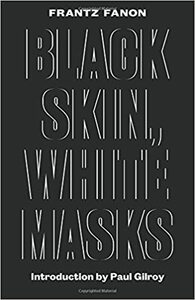You need to sign in or sign up before continuing.
Take a photo of a barcode or cover
emotional
informative
inspiring
reflective
medium-paced
4.5/5
Wonderful read. I especially liked the passages comparing black people and Jewish people in society. Fanon was so ahead of his time, apart from all the misogyny stuff which did spoil it all a bit for me.
Wonderful read. I especially liked the passages comparing black people and Jewish people in society. Fanon was so ahead of his time, apart from all the misogyny stuff which did spoil it all a bit for me.
informative
reflective
medium-paced
Truly phenomenal (… fanon-menal🤣) Will definitely be rereading!
challenging
dark
funny
informative
reflective
slow-paced
medium-paced
Very interesting book about how Black people are made to want assimilation and whiteness.
The irony of the book is how deeply it relies on psychology and sources, which are themselves riddled with racism. This also leads to a lot of misogyny and homophobia.
The irony of the book is how deeply it relies on psychology and sources, which are themselves riddled with racism. This also leads to a lot of misogyny and homophobia.
The thing that really stuck with me was the freaky subconscious sex stuff LOL psychiatrists are strange people
challenging
emotional
informative
reflective
fast-paced
challenging
dark
reflective
Having read Wretched of the Earth first, I wish I had started here. Both should be read together and back to back.
Fanon’s worldview follows a very logical evolution between the two books. Black Skin, White Masks is very openly against violence, and while his core theory that, and I’m abstracting this, you cannot reform colonized society- society as a whole needs to be deconstructed in order to completely escape colonialism and the effects of it; stays consistent between the two works, Wretched of the Earth seems like a more radical approach compared to this work.
Essential work in understanding afro-pessimism, and decolonial theory.
Fanon’s worldview follows a very logical evolution between the two books. Black Skin, White Masks is very openly against violence, and while his core theory that, and I’m abstracting this, you cannot reform colonized society- society as a whole needs to be deconstructed in order to completely escape colonialism and the effects of it; stays consistent between the two works, Wretched of the Earth seems like a more radical approach compared to this work.
Essential work in understanding afro-pessimism, and decolonial theory.
i’m gonna be completely honest, i really really struggled with this. it took me ages to get through despite its small page count because every two pages i would be muttering ‘what the fuck’ under my breath or rereading to see if i could wrangle some sense out of the last paragraph. to be completely fair, it was written over seventy years ago and has been translated from french AND the author was a 1950s psychoanalyst so that comes with a level of pseudoscience that is difficult to come to terms with today. there’s also a level of homophobia and misogyny (and misogynoir) that made me wince, but as a 21st century white person i’ll leave those criticisms to someone better equipped.
it’s one i felt i had to read because fanon and this text specifically has been referenced multiple times across my reading in uni and beyond on the subject of critical race theory, and i can see why. he makes some really salient and interesting points, he puts forward a very personal as well as broad documentation of the effect of racism and living within racist structures on the black body, he dips into poetic prose that’s honestly kind of beautiful to read. however, his writing is also often overwhelming dense and also very much a product of its time. we have lots of fantastic 21st century black race theorists that, whilst writing on a foundation of someone as influential as fanon, definitely are preferable to read in our current day and age.
i could quote multiple highly questionable paragraphs that would no doubt reiterate the ‘what the fuck’ viewpoint, but i’ve taken a notable and relevant, point about how black people working against institutional racism can never just be good enough, but must be twice as good for half the reward, instead:
‘We had doctors, teachers, and statesmen. OK, but there was always something unusual about them(…) “Our physician’s black. He’s very gentle.” (…) I knew for instance that if the physician made one false move, it was over for him and for all those who came after him. What, in fact, could one expect from a Negro physician? As long as everything was going smoothly, he was praised to the heavens; but watch out—there was no room whatsoever for any mistake.’
if you do decide to plough through this, do so at your own risk, and be prepared to scratch your head a fair amount along the way.
it’s one i felt i had to read because fanon and this text specifically has been referenced multiple times across my reading in uni and beyond on the subject of critical race theory, and i can see why. he makes some really salient and interesting points, he puts forward a very personal as well as broad documentation of the effect of racism and living within racist structures on the black body, he dips into poetic prose that’s honestly kind of beautiful to read. however, his writing is also often overwhelming dense and also very much a product of its time. we have lots of fantastic 21st century black race theorists that, whilst writing on a foundation of someone as influential as fanon, definitely are preferable to read in our current day and age.
i could quote multiple highly questionable paragraphs that would no doubt reiterate the ‘what the fuck’ viewpoint, but i’ve taken a notable and relevant, point about how black people working against institutional racism can never just be good enough, but must be twice as good for half the reward, instead:
‘We had doctors, teachers, and statesmen. OK, but there was always something unusual about them(…) “Our physician’s black. He’s very gentle.” (…) I knew for instance that if the physician made one false move, it was over for him and for all those who came after him. What, in fact, could one expect from a Negro physician? As long as everything was going smoothly, he was praised to the heavens; but watch out—there was no room whatsoever for any mistake.’
if you do decide to plough through this, do so at your own risk, and be prepared to scratch your head a fair amount along the way.









